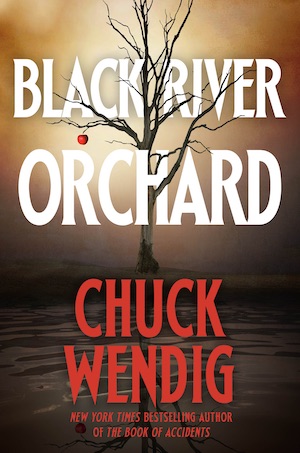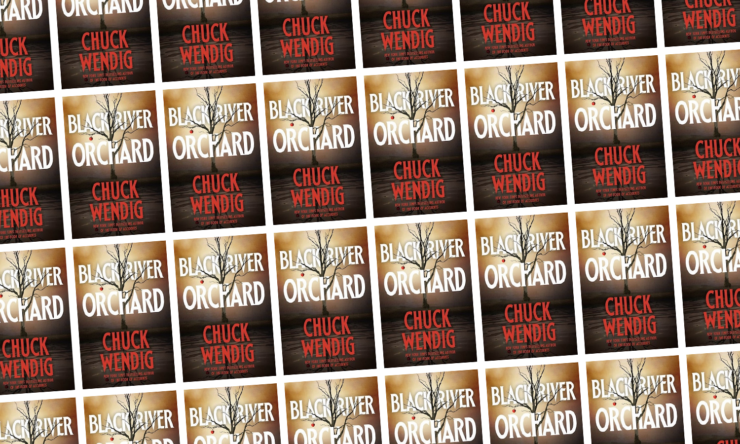Although Chuck Wendig is one of my auto-buy authors and one whose books have never disappointed me, I always try to go into a review with a healthy dose of skepticism. I want to see, as much as possible, each story as it is rather than what my rose-colored glasses want it to be. So I went into his latest doorstopper, the 640 page apple-flavored horror novel Black River Orchard, expecting to be delighted but prepared to be frustrated. Long story short: 13/10, 5 stars, highly recommend.
Harrow, Pennsylvania is a quaint town in Bucks County with a wild, deadly river running through it. “Little Dan” Paxon is about to lose the land his father died trying and failing to protect, until a Faustian bargain results in a gift that will change everything. Years later, his tiny apple orchard is finally bearing fruit. Named the Ruby Slipper by his daughter Calla—after all, there’s no place like home—the apple is a hit at the local farmers’ market. He can barely keep up with demand, but somehow the trees keep bearing fruit, apples with skin as dark as old blood and flesh so rich and juicy it’s indescribable. But soon Calla starts to notice weird things happening to the people eating Ruby Slippers. They get… weird. Angry. Violently impulsive. And eerily drawn to her father and his orchard.
With their marriage on the rocks, Emily consents to relocating with her high-strung lawyer wife Meg back to Meg’s hometown of Harrow. Emily is miserable and isolated but desperate to salvage what’s left of her marriage by complying with all of Meg’s gaslight-y demands. Meg also gets hooked on the world’s most addictive apple, and Emily finds herself trapped in a house haunted by loathing and cruelty. Joanie has also returned to Harrow after an absence, bringing with her her husband Graham. The pair operate an S&M house rental for income and indulge in their own kinks for fun. However, their proclivities and progressive attitudes have run afoul of their neighbors, particularly Prentiss Beckman, the son of an old local family with too much money and not enough empathy.
Buy the Book


Black River Orchard
John Compass, meanwhile, has spent the latter part of his life trying to atone for his past by hunting down “lost” varietals. The Lenape and the Dutch once cultivated apples on the same land Little Dan is growing his poisonous fruit, the former to provide for their community and the latter to steal territory and colonize the land. The Paxon apple is something very, very old, seeds grown in blood and bone, and John knows that nothing good will come of it. All of these people orbit around the Ruby Slipper, drawn into ancient legends and forgotten histories written in viscera. Dan, seduced by power and money and whatever the hell is in those apples, sets his sights on the Crossed Keys. The group was founded decades ago by a Richie Rich type who hosted bacchanals on his Harrow estate and reveled in the brutality that ensued. Now it functions as a secret society of local elites who push their version of law and order on their town.
A story of power and the lengths people will go to get it, Black River Orchard is as intense as it is long. Wendig is great at building tension slowly, like a thumb screw twisting so slowly you barely notice it until suddenly the pain is the only thing you can feel. This is a story that takes its time, but the reward for those who stick with it is *chef’s kiss*.
Although I don’t read much horror in general, I’m a fan of queer horror, especially the young adult variety. Black River Orchard isn’t queer horror, but it is horror with queer characters in it, another thing I love. In a novel like Ryan La Sala’s The Honeys, Mars being genderfluid feeds into every layer of the structure; the queerness is the plot. Hence it being queer horror. In Black River Orchard, queerness is central to how several of the characters move through the world. It doesn’t make or break the plot itself, but it also can’t be excised from it without fundamentally breaking the characters. Crucial to the story, but not the driving force of it.
For so long, marginalized readers never got to see ourselves in media, or if we did it was only as a villain or a caricature. We were weren’t allowed to be fully realized people, just a pile of hastily sketched stereotypes written by someone who did not care about whether or not they were even in the same galaxy as authenticity. We needed positive representation because all we had was the bad and harmful kind. But these days queer rep is not so rare anymore. Now I want more than “good” representation. I want representation that is broad and diverse. I don’t want queer characters who are positive reflections of ourselves, who are never problematic, who move through the world with understanding and awareness. I want us to be flawed and messy and complicated. I want us to fuck up and fuck others over. In short, I want us to get the same variety of behaviors and personalities that the cisallohets get. I want us to be.
What Black River Orchard does so well is give the reader queer representation that isn’t inherently positive or “good” in the moral sense. Almost all of the big players—both heroes and villains—and a couple of the minor ones as well are queer, and several are (also) BIPOC. Wendig avoids falling into common literary traps about queer people while also giving them room to make good choices, terrible choices, and everything in between. The central conflict between Meg and Emily arises not out of them being lesbians but at the foundations of abuse their relationship was built on. On the other hand, one of the Big Bads’ whole deal is that they chose to suppress their bisexuality to the point of that suppression becoming a yawning pit of self-loathing. They made that choice not because of fear or conversion therapy but because they wanted the power and privilege that came with heterosexuality more than they wanted the freedom to be themself. The bisexual character isn’t evil because they’re bi; they’re evil and bi. It’s not often a presumably allo author writes an acespec and/or arospec character that doesn’t leave me cringing at least a little from all the stereotyping, but I am ride or die for John Compass.
Wendig also slid in some fun little threads to connect Black River Orchard to a couple of his other novels. I love the idea of a Wendig multiverse of horror. If we get Mookie Pearl or Miriam Black references in the next book, I might actually pass out. We also got a little real world nod to the book banning chaos and rampant fascist bigotry happening in Bucks County, Pennsylvania right now. (If you don’t know what’s going on out there and the right-wing extremist takeover of the school board, look it up.)
I have to side with Calla here and say that apples are just not my thing. To be fair, I haven’t eaten any of the heirloom varieties, but that’s mostly because the blerghiness of grocery store apples have ruined me from ever wanting to even think about tasting the others. And honestly, after Chuck Wendig’s Black River Orchard, I’m good on ever having anything apple ever again. I will never get the image of that poor kid with the rows of appleseeds bursting through their gums like little shark teeth out of my head. Johnny Appleseed, that colonizing little jerk, can suck it.
Black River Orchard is published by Del Rey.
Read an excerpt.
Alex Brown is a Hugo-nominated and Ignyte award-winning critic who writes about speculative fiction, librarianship, and Black history. Find them on twitter (@QueenOfRats), bluesky (@bookjockeyalex), instagram (@bookjockeyalex), and their blog (bookjockeyalex.com).










